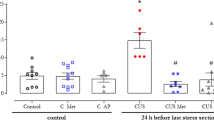Abstract
Rationale
Originally described as a pivotal mediator of acute neuroendocrine responses to stress, corticotropin-releasing hormone (CRH) is currently envisioned as a peptide neurotransmitter involved in the pathogenesis of anxiety and depressive disorders; it has been postulated that antidepressant drugs are clinically effective insofar as they are able to reduce central CRH production and release.
Objectives and methods
In this study we used a well validated in vitro model, i.e. acute rat hypothalamic explants, to investigate the effects of the antidepressant mirtazapine on the production and release of CRH from the hypothalamus in short-term experiments. CRH release was assessed through the measurement of CRH immunoreactivity in the incubation medium.
Results
We found that mirtazapine reduces in a concentration-dependent manner both basal and K+-stimulated CRH release in 30-min and 60-min experiments. Mirtazapine had no effect on CRH mRNA expression in 1-h and 3-h experiments; the intra-hypothalamic levels of peptide were not reduced, and even tended to increase, with respect to controls.
Conclusion
Mirtazapine reduces CRH release from CRH-containing neurons in the rat hypothalamus through a mechanism independent from the modulation of CRH gene expression and peptide production.




Similar content being viewed by others
References
Chomczynski P, Sacchi N (1987) Single-step method of RNA isolation by acid guanidinium thiocyanate-phenol-chloroform extraction. Anal Biochem 162:156–159
Costa A, Nappi RE, Smeraldi A, Bergamaschi M, Navarra P, Grossman A (2001) Novel regulators of the in vitro release of hypothalamic corticotrophin-releasing hormone two decades after its discovery: a review. Funct Neurol 16 (Suppl 4):205–216
De Bellis MD, Gold PW, Geracioti TD Jr, Listwak SJ, Kling MA (1993) Association of fluoxetine treatment with reductions in CSF concentrations of corticotropin-releasing hormone and arginine vasopressin in patients with major depression. Am J Psychiatry 150:656–657
De Boer T (1995) The effects of mirtazapine on central noradrenergic and serotonergic neurotransmission. Int Clin Psychopharmacol 10 (Suppl 4):19–23
De Boer TH, Maura G, Raiteri M, de Vos CJ, Wieringa J, Pinder RM (1988) Neurochemical and autonomic pharmacological profiles of the 6-aza-analogue of mianserin, Org 3770 and its enantiomers. Neuropharmacology 27:399–408
Gilman M (1994) RNase protection assay. In: Ausubel FM, Brent K, Kingston RE, Moore DD, Seidman JG, Smith JA, Struhl K (eds) Current protocols in molecular biology, vol 1. Wiley, New York, pp 4.7.1–4.7.8
Holsboer F (1999) The rationale for corticotropin-releasing hormone receptor (CRH-R) antagonists to treat depression and anxiety. J Psychiatr Res 33:181–214
Holsboer F, Barden N (1996) Antidepressants and hypothalamic-pituitary-adrenocortical regulation. Endocr Rev 17:187–205
Keck ME, Holsboer F (2001) Hyperactivity of CRH neuronal circuits as a target for therapeutic interventions in affective disorders. Peptides 22:835–844
Laakmann G, Schüle C, Baghai T, Waldvogel E (1999) Effects of mirtazapine on growth hormone, prolactin, and cortisol secretion in healthy male subjects. Psychoneuroendocrinology 24:769–784
Modell S, Yassouridis A, Huber J, Holsboer F (1997) Corticosteroid receptor function is decreased in depressed patients. Neuroendocrinology 65:216–222
Navarra P, Tsagarakis S, Faria MS, Rees LH, Besser GM, Grossman AB (1991) Interleukins-1 and -6 stimulate the release of corticotropin-releasing hormone-41 from rat hypothalamus in vitro via the eicosanoid cyclooxygenase pathway. Endocrinology 128:37–44
Nemeroff CB, Owens MJ, Bissette G, Andorn AC, Stanley M (1988) Reduced corticotropin releasing factor binding sites in the frontal cortex of suicide victims. Arch Gen Psychiatry 45:577–579
Ohgo S, Nakatsuru K, Ishikawa E, Matsukura S (1991) Interleukin-1 (IL-1) stimulates the release of corticotropin-releasing factor (CRF) from superfused rat hypothalamo-neurohypophyseal complexes (HNC) independently of the histaminergic mechanism. Brain Res 558:217–223
Persaud R (2000) Recurrent depression and stressful life events. Arch Gen Psychiatry 57:617–618
Pozzoli G, Bilezikjian LM, Perrin MH, Blount AL, Vale WW (1996) Corticotropin-releasing factor (CRF) and glucocorticoids modulate the expression of type 1 CRF receptor messenger ribonucleic acid in rat anterior pituitary cell cultures. Endocrinology 137:65–71
Pozzoli G, Tringali G, Dello Russo C, Vairano M, Preziosi P, Navarra P (2001) HIV-1 Gp120 protein modulates corticotropin releasing factor synthesis and release via the stimulation of its mRNA from the rat hypothalamus in vitro: involvement of inducible nitric oxide synthase. J Neuroimmunol 118:268–276
Raadsheer FC, Hoogendijk WJ, Stam FC, Tilders FJ, Swaab DF (1994) Increased numbers of corticotropin-releasing hormone expressing neurons in the hypothalamic paraventricular nucleus of depressed patients. Neuroendocrinology 60:436–444
Rybakowski JK, Twardowska K (1999) The dexamethasone/corticotropin-releasing hormone test in depression in bipolar and unipolar affective illness. J Psychiatr Res 33:363–370
Schüle C, Baghai T, Goy J, Bidlingmaier M, Strasburger C, Laakmann G (2002) The influence of mirtazapine on anterior pituitary hormone secretion in healthy male subjects. Psychopharmacology 163:95–101
Schule C, Baghai T, Zwanzger P, Ella R, Eser D, Padberg F, Moller HJ, Rupprecht R (2003) Attenuation of hypothalamic-pituitary-adrenocortical hyperactivity in depressed patients by mirtazapine. Psychopharmacology 166:271–275
Tringali G, Aubry JM, Moscianese K, Zamori C, Vairano M, Preziosi P, Navarra P, Pozzoli G (2004) Valproic acid inhibits corticotropin releasing factor (CRF) synthesis and release from the rat hypothalamus in vitro: evidence for the involvement of GABA-ergic neurotransmission. J Psychiatry Neurosci (in press)
Zobel AW, Yassouridis A, Frieboes RM, Holsboer F (1999) Prediction of medium-term outcome by cortisol response to the combined dexamethasone-CRH test in patients with remitted depression. Am J Psychiatry 156:949–951
Zobel AW, Nickel T, Kunzel HE, Ackl N, Sonntag A, Ising M, Holsboer F (2000) Effects of the high-affinity corticotropin-releasing hormone receptor 1 antagonist R121919 in major depression: the first 20 patients treated. J Psychiatr Res 34:171–181
Acknowledgements
This work was supported by Organon Italia S.p.A.
Author information
Authors and Affiliations
Corresponding author
Rights and permissions
About this article
Cite this article
Fabricio, A.S.C., Tringali, G., Pozzoli, G. et al. Mirtazapine acutely inhibits basal and K+-stimulated release of corticotropin-releasing hormone from the rat hypothalamus via a non-genomic mechanism. Psychopharmacology 178, 78–82 (2005). https://doi.org/10.1007/s00213-004-1984-6
Received:
Accepted:
Published:
Issue Date:
DOI: https://doi.org/10.1007/s00213-004-1984-6




